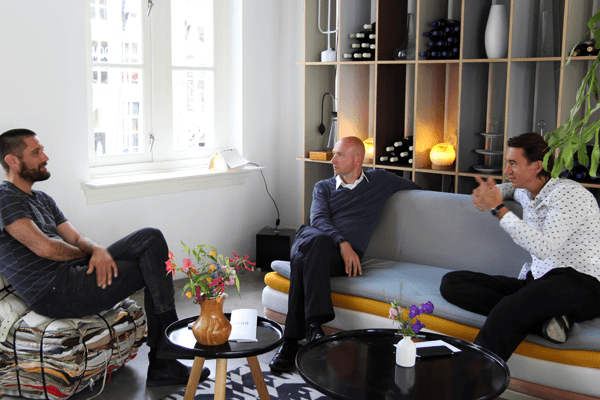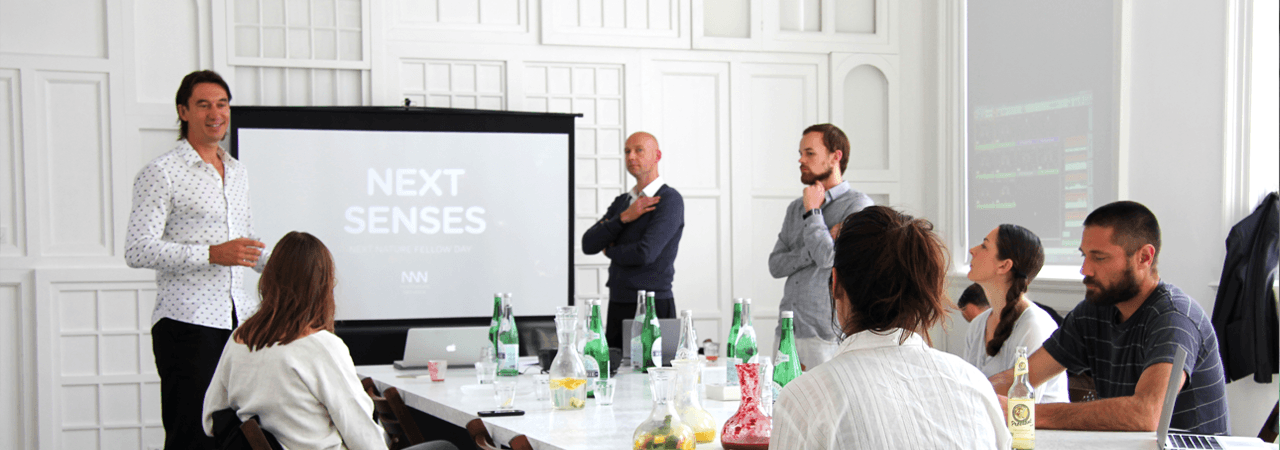If you could have another sense, which sense would you choose? Would you like to have the ability to sense electromagnetic fluctuations like sharks do? Would you prefer to hear the urban soundscape of WiFi signals? Or would you like an extra organ that regulates the usage and sensitivity of the senses you already have? Recently our NNN fellows, people from different disciplines working in and around the next nature theme, came together to explore the uncharted territory of a new project: Next Senses. How do we want to perceive the world? The world we live in has changed drastically over the ages, but our everyday means of perceiving it remained the same. Isn’t it time to reevaluate the way we access to the outer world?
Hearing colors or sensing electromagnetic fields, these people can already do it
A few attempts have already been made to extent our perception with extra artificial senses. Neil Harbisson has a head-mounted camera that translates light waves, or colors, into a vibration he can hear, making him able to hear colors. Cybernetics professor Kevin Warwack has, among other electronics, sensors implanted into the nerves of his left arm, which communicate with a sensor in the hand of his wife, enabling him to share the sensation of touch with his wife. There is even a group of people, called grinders or biohackers, experimenting with DIY magnetic implants that allow them to sense electromagnetic fields. But these attempts are all quite preliminary compared to what might be possible, perhaps due to a big taboo resting on human enhancement. Taboos, however, fade away over time. So, what can we expect from these emerging technologies that are supposed to broaden our perceptive horizon?
Data as a sixth sense
Can data be a sixth sense? This was the question that socialpreneur Peter van Eijndhoven, one of the organizers of the Fellow Day, asked to the participants. Could data be a sort of meta-sense that can objectively keep track of our behavior and the physiological processes that underlie it and enable us to consciously intervene in our behavior? Van Eijndhoven explained from his experience that “the data itself is not important. It’s about how you relate to it. Data is just a reality check”.
 Govert Flint stimulating the discussion
Govert Flint stimulating the discussion
Being able to smell cancer
During the discussions the attention was drawn to how we experience our senses and what the possibilities might be. Artist and researcher Arne Hendriks asked: “What if our smell would be a million times more sensitive? Would that still relate to our current experience of smell, or would it be so radically different that it can be entitled to be a sense in its own right?”. Dogs, for example, can trace a scent trail, however faint, and distinguish it from all other scents present. We can only smell the sum of all the individual scents as a single uniform scent; we are not experiencing a “scentscape” like dogs do. Yet the olfactory organs of dogs are only a 40 fold more sensitive than the human ones. So what would it be like to smell a million times better? You might be able to smell how somebody is feeling, if someone is lying, what day is it or if somebody has cancer. NASA achieved the latter with an electronic nose that can smell the difference between normal brain cells and cancerous brain cells. Now, how would cancer smell? What if cancer turns out to be the nicest smell in the world? Anyway, we can be sure about one thing: an extremely sensitive nose will have extraordinary, unexpected applications.
Gaining one sense at the expense of another
It would be useful to know what would actually happen on a neurological scale when we gain a new sense. “Do new senses replace old ones?” asked artist Maria Verstappen. Or might new senses get mapped onto existing ones? By default our brain is wired for our five main senses: sight, hearing, taste, smell and touch. But what if we could get a sixth sense or augment an existing one? In 2013 researchers gave rats a neural implant that enabled them to see infrared light. Interestingly, they connected the infrared sensor to the part of the brain normally associated with touch. At first the rats misinterpreted the new stimuli for touch, but after a month their brains were rewired enough for them to really see the infrared light. All the while, their sense of touch remained intact, though it’s unsure if their sensitivity for touch remained equal as well.
It is a common assumption, and a well-founded one, that blind or deaf people compensate their lost sense of sight or hearing by learning to use their other senses more efficiently. The auditory cortex of deaf people is repurposed to amplify the sensitivity of vision and touch. The brain's capability to adapt to different stimuli is called neuroplasticity. It seems that the brain is equipped to make sense of a certain amount of stimuli in whatever form they are presented. This means that when exposed to additional stimuli, for instance a sixth sense, it is at the expense of other incoming stimuli - whether that is sight, hearing, smell, taste or touch. In relation to the speculation of having a sense that is a million times more sensitive, it would mean our brains will have a hard time processing all that extra data. To accommodate a profound sense of smell, for instance, our other senses would have to pay the price, maybe making us practically blind or deaf.
Senses as filters instead of gateways
We have uncovered an interesting dilemma. If it's one sense or the other, which ones do we want? Or can we work around this dilemma? Perhaps we can. Aldous Huxley describes in his book The Doors of Perception that senses might not be "doors in the wall" that lend us access to the world, but they are rather filters that filter out anything impractical and, thus, create a coherent synaesthetic experience that maximizes the efficiency with which we interact with the world around us. The so called Cocktail Party Effect makes us able to focus our attention on a single voice while filtering out all the others voices around, much like a partygoer in a noisy room. The artificial augmentation of our sensory repertoire must be accompanied by a processing unit that helps our brain make sense of the data. The electronic nose, for example, was specially designed to distinguish cancer cells from non-cancer cells; it wasn't designed to smell food or perfume or anything else. If this hypothetical extremely sensitive nose could filter the stimuli for usefulness before it feeds it back to the brain it would severely increase functionality. Imagine that all the exhaust fume odors are filtered out, while augmenting certain smells of plants and people.
Artificial senses enhancing our humanity
During the day our fellows did a workshop on the Pyramid of Technology, where the participants were divided in three groups to speculate on how a new sense could travel from the envisioned stage to the naturalized stage. The funny thing is that the three ideas were all 'meta-senses' that regulated, though each in their own way, the senses already present. The first group envisioned a sense that literally regulates all the other senses. When you want to work in silence you just 'turn off' your hearing. The second group came up with the idea to be able to consciously boost particular areas of the brain when needed. You need to solve problems? Emphasize your frontal lobe, which is largely responsible for analytical thought and reasoning. Are you chatting with friends or coworkers, then emphasize your temporal lobe, which is responsible for language and memories. And the third group delivered the so called "Empatech", a technology that's part of the skin, able to sense if people nearby need your empathy. The Empatech can feel what others feel and allows you to share their experience. Arne Hendriks pondered upon how it would be "to feel the emotions that another person is feeling, but without having experienced the cause of those emotions".
 The "Empatech" group, from left to right: Arne Hendriks, Peter van Eijndhoven and Koert van Mensvoort
The "Empatech" group, from left to right: Arne Hendriks, Peter van Eijndhoven and Koert van Mensvoort
What's interesting is that the common denominator for these ideas is that they all strive to enhance our humanity. They are extensions of what we can already do. We already divide our attention between our senses, like group one proposed. When hearing a loud, unexpected bang our auditory system overrules all the other senses and instinctively tries to find the source of the sound. Group two speculated upon boosting different parts of the brain, yet our brain already performs this feature. When we try to focus on a difficult task we are in a different state of mind than when we are having fun with friends. And to some extend we are already outfitted with Empatech. The facial expressions of other people evoke corresponding emotions in ourselves. Our brains, for example, release endorphins when we see other people laughing, so we share their happiness. Based on these ideas it becomes clear that we want to be more human, but in a rational way. The processes that are now largely instinctive ought to be more deliberate. What we want is 'a sense' of control.
Do all possible senses already exist?
At some point one participant made the remark that "it is not possible to come up with a new sense; that's like trying to imagine a new color". "Are there new senses to be discovered at all? Isn't everything there already?" somebody else said. To which NNN director Koert van Mensvoort responded that "500 million years ago not every sense we have today had evolved yet". Smell, vibration and touch preceded sight, for example. On the other hand, our main senses evolved roughly around the same time in evolutionary history and they exist, though in a large variety of forms, for more than 300 million years. Therefore it seems unlikely that organic evolution will come up with new senses any time soon. Possible or not, it is arguable if we need to come up with new, non-existing senses. It is not the case that we, humans, possess all the senses present in the animal kingdom - like elektroreception, echolocation, magnetoception and others. Then what about a sense for WiFi signals? Isn't that a sense that evolution hasn't come up with? Obviously that is because WiFi is around for such a brief period in evolutionary time that evolution has not yet been able to adapt to it. But a WiFi signal is nothing more than electromagnetic radiation, or light. Our eyes are, therefore, WiFi signal receptors. We simply don't see them because our eyes are not sensitive to the electromagnetic spectrum that defines WiFi signals, but technically it would be possible. What we can conclude is that it's not about creating new senses, it's about shifting the functionality of our present senses to complement our modern lives more.
Designing our perception of the environment
Our senses have evolved over millions of years by natural selection in a natural environment. Our synesthetic experience of our surroundings has been programmed for survival. Taste makes us able to differentiate between possibly toxic, which is often bitter, and nutritious food. Smell, too, is for filtering out unhealthy food, but also to select sexual partners. Nowadays, however, survival is out of the equation in the western world. Our senses have become a means for experiencing pleasure. We love sweet food, fruity perfume, bright colorful light, melodious music and tingling textures. But it's time to not only design our environment to stimulate our senses, but also to design our senses to fit our environment. Our senses are attuned to the biosphere, but should also resonate with the technosphere.
Thank you Arne Hendriks, Teresa van Dongen, Govert Flint, Maria Verstappen, Peter van Eijndhoven, Floris Kaaijk and Lonneke Gordijn for participating in the Fellow Day 2016.

Share your thoughts and join the technology debate!
Be the first to comment